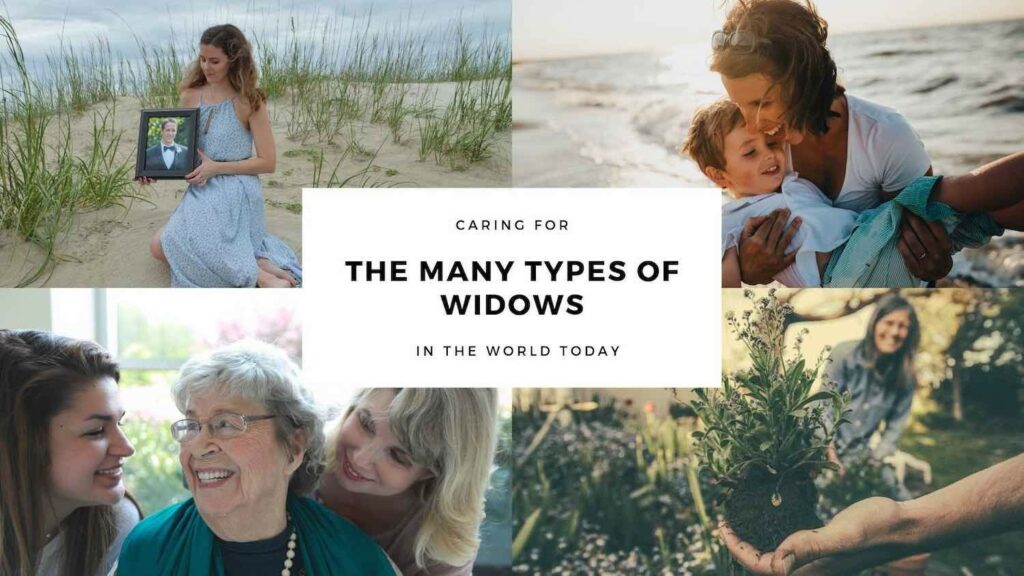The definition of a widow is a woman who has been left alone. Many women receive this title because they have found themselves in the valley of the shadow of death. Widowhood is no respecter of persons; the widow community is made up of different personalities experiencing a vast range of emotions. She can be sad, distraught, stressed, angry, bitter, confused, disappointed, tired, afraid, and sometimes all at once! Don’t be surprised if a widow finds it hard to ask for help. She isn’t used to having to rely on others to do what her husband once did, leaving anxiety to fill the gaps. In this time, it can be your goal to lovingly redirect her focus from man to God with your service to her family!
The Bible speaks on the topic of the widow approximately 90 times. God makes it clear that He loves the widow and has special concern for her. He promises to be her Defender and a Father to her fatherless children (Psalm 68:5). He gives specific guidelines and commands for the biological family (1 Timothy 5:4,8) and family of God (James 1:27) in caring for this group of women. Bottom line – ministry to the widow is not optional!
Many well-meaning churches will plan a once-a-year banquet for the widows in their church, but we have found that this alone misses the mark when looking to really care for the widow in her distress. As friends, family, and the church body to the widow we must know that above all caring for her individually and intentionally throughout the year is crucial to her healing! We know accomplishing that can be hard due to her complex needs and varying emotions, not to mention taking into consideration the stage of grief she is currently in. There are many types of widows in the world today. As you look to meet her practical, emotional, and spiritual needs we hope these care tips for each type of widow will be a support to you. And thank you, she needs you in this time, your service is not in vein.
New Widow:
She is like a deer in the headlights—stunned, immobilized, numb, and sad, very sad! If she is going to receive help from others, this is normally the season where assistance pours in. Corralling and organizing the chaos of people wanting to help is important.
Care:
- Set up a support squad
- Provide practical help
- Provide consistent love from a distance: send a text or card sharing memories of her husband and words of affirmation.
Widows beyond their 2nd year:
It is too easily assumed that the widow should be “all better” by the one-year anniversary of her husband’s passing. Here’s the proof, 75% of the widow’s support base will disappear in the first year! However, the 2nd year is often harder than the first as the reality of her new season of life sets in. It is important to keep in mind that women who have been without a husband for more than two years still have unique and complex needs—they cannot move a piece of furniture alone, they experience loneliness as they sit home by themselves, and the burden of single parenting still looms. Even though she has made progress in figuring out the new normal, her need for practical, emotional, and spiritual assistance continues.
Care:
- Fellowship: invite her over for dinner or take her out.
- Emotional support: she still needs a listening ear and to be reminded that she has not been forgotten, and neither has her late husband.
- Continue to provide practical help: she will more readily know her needs now, don’t be afraid to ask or send her a list of things you could do for her.
Widowed Mom raising the fatherless:
She must do everything alone—home and lawn maintenance, car repairs, along with carrying the weight and responsibility raising children. This is one of the most vulnerable places for a woman to be.
Care:
- Set up a support squad
- Run errands
- Provide housework
- Assist with making decisions
- Mentor and spend time with her children
- Offer transportation and/or pay for extracurricular activities
- Support financially or give towards camp scholarships, tutoring, or a mother’s helper
Older Widow:
This is who you typically imagine when you hear the word widow. While her needs are different than a young widow, she will still have many, especially depending on if she physical limitations and family support.
Care:
- Provide transportation
- Assist with making medical decisions
- Emotional support: Visit, call, and send letters. She needs to be reminded that she has not been forgotten.
- Practical needs include home, auto, and lawn maintenance.
Unique Situation Widow
Women who experience loss of husband due to a unique situation (military, suicide or tragic death) often face complicated grief or what we call grief upon grief. Not only does she grieve the death of her husband and all that brings, but she also grieves the tragic way in which he died. The extra layer of grief will prolong the process, isolate, and often create misunderstandings among friends and family.
Care:
- Counseling
- Emotional support: her situation is unique, listen without judgement and be a trusted confidant. Listen, listen, listen.
- Provide practical help
Widow Indeed:
According to 1 Timothy 5, this widow has no family or resources. The body of Christ is biblically commanded to care for her. As community surrounds her to meet her practical, emotional, and spiritual needs her focus will be directed to the One who can satisfy her deepest need.
Care:
- Provide financial counsel and financial support
- Give guidance in finding a job
- Emotional support: listen to her needs and worries, send her texts or notes of encouragement as often as you think of her.
- Provide practical help
Every type of widow is encouraged to put her trust in God, that is her greatest need (1 Timothy 5:5)! Perhaps the relationship of God to the widow allows the world to see the beauty of an intimate relationship with God. Widowhood is an opportunity for God to show Himself faithful. Through your obedience to God’s command to visit the widow and fatherless, God is glorified! Thank you.






